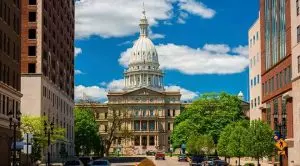 Michigan’s online gambling bill got the approval of the local Senate Committee at a special hearing. The Senate Regulatory Reform Committee gave the green light to the bill by a vote of 7-1 and allowed the piece of online gambling legislation to proceed to the Senate floor.
Michigan’s online gambling bill got the approval of the local Senate Committee at a special hearing. The Senate Regulatory Reform Committee gave the green light to the bill by a vote of 7-1 and allowed the piece of online gambling legislation to proceed to the Senate floor.
The piece of legislation presented by Senator Mike Kowall would allow only the commercial casino operators and the tribes recognised by the federal government who already run gaming operations within the state to apply for online gambling licences.
However, what is more important, taxation is considered as the main reason for the existence of Kowall’s bill. According to the Senator’s piece of legislation offered, local tribes would be required to give up their tax immunity and become commercial gaming enterprises in order to become part of the online gambling market.
At this stage, the approval won by the S 203 iGaming bill was not taken as a surprise by anyone, as most of the bill’s sponsor are currently serving as members of the Committee. Still, the decision came quickly, especially considering the fact that it was only last week when Senator Mike Kowall introduced a new series of bills regarding online gaming in the state.
Local Tribes and Stakeholders’ Reactions
The hearing was attended by a lot of the witnesses who had presented their opinions at the online gaming legislation hearing in Pennsylvania on the day before, including many representatives of Amaya, the Innovation Group, the Poker Players Alliance (PPA), the Coalition to Stop Internet Gambling, etc. In spite of their presence, the absence of the potential stakeholders in the Michigan regulated market could not be left unnoticed, especially when it came to the 12 tribal operators in the state. It exactly the support of the local tribal operators which is considered as crucial to the bill’s further success.
Four of the gaming tribes who are allowed to operate casino and gaming venues on the territory of the state of Michigan made an official notice with their open and direct opposition to the online gambling bill. The rest of the tribes, however, expressed neutral positions on the matter. The iGaming legislation in the state also received neutral positions from the three commercial gaming operators in Michigan – MGM, Greektown Casino and Detroit Entertainment.
Considering the above-mentioned taxation specifics, the tribes who refuse to become commercial gaming enterprises after giving up their tax immunity would not be allowed to run online gambling operations across the state. This is considered one of the main reasons why four of them have openly expressed their opposition to the bill. Some experts have shared opinions that the state could allow them to keep their immunity or even offer them tax-free online gambling operations in order to gain their support, but still, nothing could be said for sure.
The bill in its current form includes imposing a tax of 10% to local commercial operators who would like to become part of the online gambling market. Despite the legislation’s passing to the Senate floor, the battle for online gambling still lies ahead in Michigan, which is considered as one of the states that are most likely to legalise iGaming along with the state of Pennsylvania.
- Author


